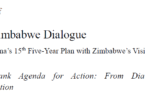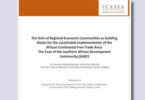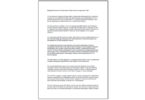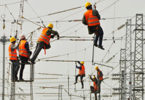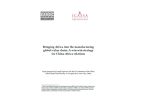Speech by H.E. Li Keqiang
Premier of the State Council of the People’s Republic of China
At the AU Conference Centre
Addis Ababa, 5 May 2014
Your Excellency Prime Minister Hailemariam,
Your Excellency Chairperson Zuma,
Dear Friends,
Ladies and Gentlemen,
Good morning! I am very happy to be here in Addis Ababa, known as the political capital of Africa, and speak at the AU Conference Center, a symbol of China-Africa friendship, among friends who have long supported and worked to promote China-Africa cooperation. I want to thank Chairperson Zuma and Prime Minister Hailemariam for their heart-warming remarks. My thanks also go to the Ethiopian government and the AU Commission for their thoughtful arrangements. On behalf of the Chinese government and people, let me extend cordial greetings and best wishes to the governments and peoples of African countries!
This is my first visit to Africa as Chinese premier, and the second time for me to set foot on this fascinating continent. For Chinese people of my generation, the independence movement of African nations and the construction of Tazara Railway were familiar stories as we grew up. Five years ago, I visited Egypt, the land of the Pharaohs. Today, I am here in Ethiopia, the “roof of Africa”. I am deeply impressed by the similarity between the Chinese and African people in their historical experiences, development tasks and aspirations. We are encouraged by the new achievements of African countries in their endeavor to seek strength through unity. China-Africa cooperation has also entered a new stage of development featuring higher quality and enjoys broad prospects. People now see Africa as a continent full of vitality that plays a critical role in the global political and economic landscape. And to me, Africa could be considered as a “pole” in three aspects:
First, with a total of 54 countries, Africa occupies a quarter of the United Nations seats and plays an important role in maintaining peace and stability in the world. While steadily increasing their overall strength thanks to an accelerated integration process, African countries have stood together on such major issues as global development, climate change and reforms of international governance systems, and spoken with one voice. With the rise of developing countries, the whole world needs to heed Africa’s voice and give full respect to Africa’s role as Africa has become a key force contributing to a multi-polar world and greater democracy in international relations. Africa is indeed a significant pole in the political stage of the world.
Second, boasting vast geographical expanse, abundant resources and industrious population, Africa’s huge development potential as a community of one billion people is being vigorously unleashed. Since the beginning of the 21st century, Africa’s economic growth has picked up speed. With an average annual growth rate of over 5%, Africa now ranks among the fastest growing regions in the world, a bright spot in the gloomy global economy under the impact of the financial crisis. With an economic aggregate of US$2 trillion, Africa is commonly recognized as a major emerging global market. Africa is indeed the latest pole in global economic growth.
Third, Africa has a time-honored history and brilliant culture. It is the origin of human civilization and has had a far-reaching impact on the world’s cultural diversity, exchanges and dissemination. Mankind’s common “grandmother” Lucy, the ancient Pyramids, the simple but rhythmic drumbeats and the rustic and passionate dances are all held up as shining brand names of Africa. African civilization has shed brilliant lights on the present-day music, sculpture, painting and other art forms of the world. Africa is indeed a colorful pole in world civilizations.
“When spiders unite, they can tie down a lion.” This Ethiopian proverb vividly portrays a simple truth that unity is strength. Today’s Africa is marching towards integration. Today’s AU is playing an increasingly important role in African and world affairs. China will continue to strengthen relations with the AU and firmly support it in spearheading African integration and upholding peace and security in Africa, and in playing an even bigger role in regional and international affairs. China is ready to provide assistance to the AU to the best of its ability. We have high esteem for the great people living on this continent. And we have full confidence in the bright future of Africa.
Ladies and Gentlemen,
Half a century ago, during his visit to 10 African countries, the late Premier Zhou Enlai proposed the five principles for China’s relations with African and Arab countries and the eight principles for China’s economic aid and technical assistance to other countries, which need to be commemorated and carried forward. Over the past five decades, Chinese and African people have helped each other and fostered an unbreakable bond of friendship. As a poet once said, “You may have forgotten the person whom you laughed with; but you will never forget the one whom you wept with.” In the 1960s and 70s, to support the cause of national liberation in southern Africa and smash the blockade imposed by the apartheid regime, the Chinese people assisted the construction of the Tazara Railway against great odds. Sixty-five fine sons and daughters of China gave their lives for the construction of the railway and were laid to rest on the African continent. In the same vein, when China’s lawful seat was restored in the UN, our African brothers burst into tears of happiness, celebrating this as a great victory of developing countries. The history of our common struggle for a common destiny will always be our precious memory and inspiration and an inexhaustible driver for the future growth of China-Africa relations.
In the 21st century, China and Africa have enjoyed growing political mutual trust and frequent high-level exchanges. Last year, the successful visit of President Xi Jinping to Africa and the visits of many African heads of state and government to China lifted the new type of China-Africa strategic partnership to a new height. In the same year, China-Africa trade reached US$210.2 billion, registering an increase of more than 2,000 times over the 1960 figure. For five years in a row, China has been Africa’s largest trading partner. China’s FDI in Africa has grown from zero to over US$25 billion in accumulative terms, delivering tangible benefits to both the Chinese and African peoples. Both history and reality tell us that when China develops well, Africa will get opportunities; when Africa develops well, China will stand to benefit; and when China and Africa all make progress in development, the world will become a better place for mankind to live in.
The present-day world is undergoing profound and complex transformation. The AU is drawing up an ambitious blueprint, Agenda 2063, for the continent’s next 50 years of development. And China is working hard to realize the Chinese dream of the great renewal of the Chinese nation. With both sides facing the task of achieving modernization, China-Africa relations have entered a new period of development. During his visit to Africa last year, President Xi Jinping made a commitment to developing relations with Africa with sincerity, real results, affinity and good faith. China will always honor the commitment and work together with Africa to upgrade China-Africa relations. The relationship between China and Africa is one marked by shared interests, common development and cultural exchanges. To further deepen China-Africa cooperation, I believe we need to stick to the following four principles.
First, treat each other with full sincerity and as complete equals. Chinese and African civilizations have a close affinity as they both abound with distinctive cultural features, both cherish ancestral roots and both advocate equality, sharing, solidarity and collaboration. We could be called “close neighbors” in a cultural sense. Nelson Mandela, the proud “Son of Africa”, once said, “Western civilization did not completely erase my African origin.” The perseverance with which he tenaciously pursued equality commands our admiration. Both China and Africa were subjected to aggression and oppression by colonialism and imperialism in the past, and we both deeply value independence and equality. Neither of us has imposed our own will on others or interfered in each other’s internal affairs. We both stand for resolving problems arising from cooperation through equal consultation. China’s aid to Africa has never been attached with political strings. All this has constituted a defining cornerstone for the ever growing friendship between China and Africa.
Second, enhance solidarity and mutual trust. As an ancient Chinese philosopher said, “Those who want to establish themselves in society should begin by helping others to do so; those who want to become prosperous should help others to get rich first; and no one should do to others what he does not want others to do to himself.” As mutual respect is a crucial prerequisite for enhanced mutual trust, China and Africa have treated each other’s core interests and major concerns with consistent respect. China has spoken out in support of Africa’s just cause and legitimate positions. And Africa has consistently supported China in its efforts to uphold its major interests. By coordinating and collaborating closely in regional and international affairs, China and Africa have effectively safeguarded the common interests of developing countries. With respect to multilateral issues, China and Africa have often found themselves having either common or similar concerns and positions; with respect to issues concerning security and stability at the regional level, China and Africa have always maintained effective communication and dialogue. China has contributed more personnel to UN peacekeeping operations in Africa than other permanent members of the UN Security Council, and Chinese peacekeepers are serving their duties in multiple hotspot areas across the continent. The solidarity and mutual trust between China and Africa serve not only our respective development but also peace and progress of the world.
Third, jointly pursue inclusive development. China is the world’s largest and most populous developing country and Africa the continent with the highest concentration of developing countries. China has a fairly solid foundation in science and technology and relatively abundant capital, while Africa boasts a huge market potential and plentiful labor resources. The high degree of economic complementarity and frequent investment and commerce have linked the two sides in an inseparable bond that leverages their respective strengths. China stands ready to exchange development experience and share development opportunities with African countries to promote inclusive development. We are willing to share with Africa those readily applicable technologies that China has developed without any reservation. We are also ready to transfer, on a priority basis, suitable labor-intensive industries to Africa to promote employment in Africa, as this is good for both sides and benefits the two peoples. China sincerely hopes to see Africa diversify its cooperation partners, welcomes greater international input into Africa, and is ready to carry out cooperation schemes in Africa involving third parties.
Fourth, innovate on practical cooperation. Africa is at the initial stage of an economic takeoff and China is striving to achieve modernization. Both sides are fast integrating into the ongoing economic globalization. China-Africa cooperation, which is consistent with the trend of the world, requires that we base ourselves on our respective development stages, give consideration to each other’s concerns, and constantly seek and expand the areas of converging interests. We should not limit our cooperation to energy, resources and infrastructure but expand it to industrialization, urbanization, agricultural modernization and many other areas, and put greater emphasis on green and low-carbon development as well as ecological and environmental protection. What is more, we should combine the role of the market with that of the government, enhance the synergy of business-society interactions and innovate on practical cooperation, so as to make China-Africa cooperation a model of complementarity, practical results and efficiency.
Ladies and Gentlemen,
With splendid chapters already written, China-Africa cooperation is poised to turn a brand new page. Characterized by their unprecedented scope of common interests and a much more solid foundation, China-Africa cooperation should seize the good opportunity and focus on the future. China would like to make joint efforts with African countries to actively promote major projects in six areas to upgrade our cooperation.
First, we need to work together on industrial cooperation projects. In recent years, trade between China and Africa has grown rapidly. In the next stage, we may scale up our trade both quantitatively and qualitatively to reach the goal of increasing the volume of China-Africa trade and China’s direct investment in Africa to US$400 billion and US$100 billion respectively. China will actively participate in Africa’s industrialization and strengthen industrial cooperation with Africa. We will promote the development of such labor-intensive and manufacturing sectors as textile, garment and household appliances, work for the transformation and upgrading of energy and resource industries, enhance Africa’s capacity of self-development and achieve the alignment of industrial development strategies between China and Africa. Infrastructure is essential to industrial development. China will get actively involved in highway, railway, telecommunications, electric power and other projects in Africa to facilitate regional connectivity. China proposes a China-Africa Regional Aviation Cooperation Plan, under which we will encourage Chinese enterprises to set up aviation joint ventures with African counterparts to provide civilian regional jets and jointly develop regional aviation in Africa. To help Africa achieve the goal of building a high-speed railway network, China is ready to conduct cooperation with Africa in engineering, equipment, standards and planning and establish a high-speed railway R&D center in Africa to share with our African partners relevant technologies, experience and training and management expertise.
Second, we need to work together on financial cooperation projects. Finance is vital to our practical cooperation. China has decided to provide an additional US$10 billion credit line to African countries for mutually agreed projects, raising the total amount of promised credit to US$30 billion. We will also put another US$2 billion into the China-Africa Development Fund to raise it to US$5 billion. We hope the special loans for African SMEs will be made good use of to support their development. We want to work with the African Development Bank to establish a joint financing fund and build a trilateral cooperation platform for Africa’s infrastructural development, including the regional aviation network and high-speed railway network. China supports bilateral cooperation in cross-border local currency settlement, currency swap, and mutual establishment of financial branches.
Third, we need to work together on poverty reduction projects. Poverty is a public enemy of mankind, and poverty reduction is of great importance for improving people’s lives. China has seen a big success in poverty reduction in the past two decades. Yet by World Bank standards, over 200 million people in China are still living below the poverty line. Poverty reduction in Africa is similarly a daunting task. During my visit, China and the AU issued the Program for Strengthening China-Africa Cooperation on Poverty Reduction. We are ready to share our experience with African countries on poverty reduction. We will go on sending medical teams to Africa and enhance bilateral cooperation on health care. The year 2014 is Africa’s Year of Agriculture and Food Security. China will join the AU and African countries in jointly implementing the “High Quality and High Yield Agriculture Demonstration Project” aimed at upgrading agricultural technology and farm output in Africa. China will devote greater part of its assistance to Africa to providing drinking water, preventing and treating infectious diseases and other areas related to people’s livelihood.
Fourth, we need to work together on ecological and environmental protection projects. Ecological and environmental protection is our shared responsibility. Africa’s distinctive ecosystem rekindles our collective memory of mankind’s distant past and arouses our aspiration for a better homeland. To better protect Africa’s wildlife, the Chinese government has decided to provide a grant of US$10 million in support of closer technical cooperation and experience sharing between China and African countries, and the Chinese government will also strictly abide by the international and bilateral agreements it has signed on wildlife protection. We will also promote the setting up of a “China-Africa joint research center” in Kenya which will focus on bio-diversity protection, desertification control, modern agriculture demonstration and other areas of interest to Africa. We will keep stepping up our cooperation on ecological and environmental protection and actively develop clean energy and renewable energy. The aim of these efforts is to pursue development and environmental protection in a holistic way and build a green Africa that enjoys sustainable development.
Fifth, we need to work together on cultural and people-to-people exchanges. Mutual affinity grows when the hearts and minds of our people meet. We will step up cultural interactions with African countries, making such brand programs as the China-Africa Cultural Cooperation Partnership Program and the China-Africa People-to-People Friendship Action a success, setting up still more Chinese cultural centers and Confucius Institutes in Africa, and helping China-Africa friendship strike deeper roots in people’s hearts and minds. China will work through cooperation programs in science, technology and education as well as enhanced vocational training and other means to help African countries improve the caliber of their human resources. We encourage still more Chinese tourists to visit Africa and welcome African friends to come to China for visits, study, investment and business.
Sixth, we need to work together to enhance peace and security. Without a peaceful and stable environment, development will be out of the question. China firmly supports Africa in its efforts to resolve African issues in African ways. We will earnestly implement the Initiative on China-Africa Cooperative Partnership for Peace and Security, actively explore ways to help the development of an African Standby Force and African Capacity for Immediate Response to Crises, support the collective security mechanisms in Africa, expand bilateral cooperation in personnel training, intelligence sharing and joint exercises and training, and assist Africa to enhance its capacity building in peacekeeping, counter-terrorism and counter-piracy.
The Forum on China-Africa Cooperation (FOCAC) is an important platform to deepen China-Africa relationship. It has played an important role in enhancing collective dialogue and practical cooperation between the two sides. We need to continue to improve this mechanism, enrich its content and make the platform more practical and efficient. Next year will be FOCAC’s 15th anniversary. China is ready to work with Africa to make its sixth ministerial conference a success by rolling out more measures suited to the needs of both sides, keeping China-Africa bilateral cooperation always at the forefront of international cooperation with Africa and produce more fruitful outcomes in China-Africa cooperation.
Ladies and Gentlemen,
Ethiopia is a country with a time-honored civilization on the East Africa Plateau, known to enjoy thirteen months’ sunshine every year, and being the original home to the aromatic coffee. The diligent and courageous people of Ethiopia love freedom and have a glorious tradition of standing up to foreign aggression. The Ethiopian People’s Revolutionary Democratic Front, since coming into office, has rallied the Ethiopian people to actively explore a development path suited to the country’s conditions. While achieving impressive progress in nation building, Ethiopia has played an important role in regional affairs of Africa. Over the past two days since I arrived in Ethiopia, I have seen for myself that under the leadership of Prime Minister Hailemariam and the Ethiopian government, the Ethiopian people have made continuous progress in national development. I wish to extend my sincere congratulations to the Ethiopian people for what they have accomplished.
In African legend, the Phoenix, a long-lived bird, dies by fire every 500 years, only to rise from the ashes to be reborn again. In Chinese culture, you can find a similar story of a mythical bird named Fenghuang that, too, cyclically regenerates itself. These two legends seem to be telling us that the great renewal of the Chinese nation and the African continent represents an unstoppable historical trend. “Facing the vast ocean that embraces thousands of streams, let us set sail now that the wind is fair”. Let us seize the opportunities and join hands, come rain or shine, to bring about an even better future for China-Africa relations.
Thank you.

